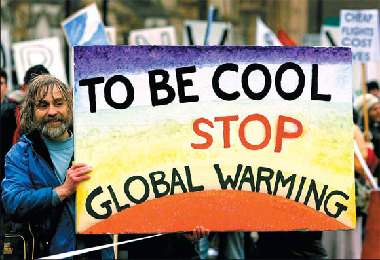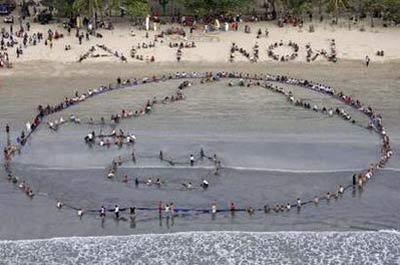There is a general sense that the United Nations Climate Change Conference in Bali is on track after a busy week of talks. However, there are still many differences that need to be resolved before the arrival of Ministers attending the High-Level segment which begins on Wednesday.
The conference, which opened on Dec. 3, went into a recess on Sunday as thousands of delegates took the day off to refresh themselves before embarking on the second week of discussions.
A protester holds a banner during a demonstration against climate change in central London on Saturday. The protest coincided with UN climate talks in Bali, Indonesia.
(China Daily/Reuters Photo)
United Nations Secretary-General Ban Ki-moon will deliver a statement at the opening of the High-Level segment on Wednesday and the segment is due to end on Friday. During these last three days of the conference, Environment Ministers will seek to reach agreement on the shape of a future international climate pact, the so-called "Bali roadmap."
Before wrapping up what he described as a busy week of talks, UNFCCC Executive Secretary Yvo de Boer on Saturday spoke of a "strong willingness" by Parties to the United Nations Framework Convention on Climate Change (UNFCCC) for an outcome at the conference, which has attracted more than 10,000 participants, including delegates, NGOs, international organizations and the media.
Yvo de Boer explained that the two-week conference needs to deliver on ongoing issues of particular importance to developing countries. This means moving forward on adaptation, transfer of technology and deforestation, as well as strengthening capacity-building. What the conference also needs to do is to launch a process on action beyond 2012, when the first commitment period of the Kyoto Protocol ends.
Yvo de Boer reiterated that no final deal on a future climate regime will be concluded at Bali, and that the goal is to launch negotiations, set an agenda on the main building blocks of a future agreement and set an end date for conclusion of the negotiations.
On the issue of emission reduction targets, Yvo de Boer said that the range of 25-40 percent for industrialized countries by 2020, agreed by Kyoto Parties earlier this year, would also be "an important reference frame for these discussions."
He went on to explain three diverging views among Parties on the issue of targets. While some countries are calling for legally binding targets for developing countries, others are calling for developing nations to limit growth in emissions if incentives are put in place for them to do so. The third discussion revolves around whether industrialized countries should take on internationally legally binding targets, or targets at the national level.
Yvo de Boer expressed the hope that this whole discussion would be taken up only at the end of the two-year debate, since countries needed to be clear first on the instruments they will have at their disposal to act on mitigation of climate change and adaptation to it. Only then would the foundations be laid for adopting ambitious targets that "make sense."
The first negotiating text that captures the different proposals which have been made to date was tabled Saturday and will be discussed on Monday, prior to the arrival of Ministers attending the High-Level segment.
Costs for both mitigation and adaptation to climate change are set to rise. A recent publication by the U.N. Climate Change secretariat on Investment and Financial Flows puts financing the response to climate change at 0.3 percent to 0.5 percent of GDP in2030, and 1.1-1.7 percent of total global investment in the same year.
Yvo de Boer said Friday that current funds under the Convention and the Protocol are insufficient to meet these goals, but that the gap can be bridged by scaling up currently available international capital dedicated to climate-friendly investments. The challenge is "huge, but not insurmountable," he said.
Hundreds of environmental activists gather to form the shape of the Earth in Kuta beach, Bali island December 9, 2007.
(Xinhua/Reuters Photo)
Of particular interest to developing countries are discussions on technology transfer. Developing countries see several barriers to technology transfer -- the major ones being intellectual property rights (IPR) and finances.
"Tech transfer must be facilitated within a specified framework that is time bound and can be monitored for effective implementation," said the Group of 77 on behalf of developing countries in a statement on Saturday.
As negotiations will pick up momentum in the second week, the Bali conference is in full swing for a breakthrough in the form of a roadmap for enhanced global action to fight climate change in the period after 2012.
(Xinhua News Agency December 10, 2007)



